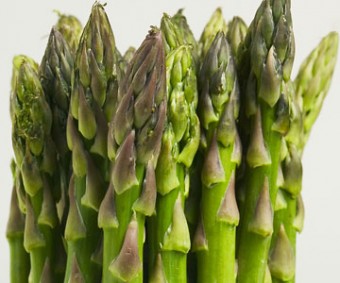Saturday, June 7, 2014
Why Asparagus Makes Pee Smell
Do you like this story?

The smell comes from the way certain chemical compounds in asparagus break down inside people’s bodies. This is why cooking asparagus in various ways does not result in the same smelly byproduct; the specific digestive enzymes that break down the compounds in the asparagus to produce the smell aren’t present until you eat the asparagus.
As to this specific resulting chemical compound that ends up causing the smell, it has long been thought that it is from methanethiol. Methanethiol is a colorless gas which smells a bit like rotting cabbage. It is composed primarily of sulfur, but also includes hydrogen and carbon.
More recent research by Robert H. White from the University of California proposes an alternative theory. White used gas chromatography-mass spectrometry to try to identify the cause of the smell and he concluded that it was actually from the s-methyl thioesters- specifically s-methyl thioacrylate and s-methyl thiopropionate. Thioesters, like methanethiol, are primarily sulfur based except are formed from sulfur bonding with an acyl group.
In either case, the ability of a particular person to produce the necessary smelly compound in their urine after digesting asparagus was thought to be a genetic trait unique to only some humans until relatively recently. Recent research done in France, China, and Israel, all independently showed this is not the case. Rather, all humans appear to produce the smelly compound, but only some humans can detect the smell; the ability to detect the smell or not is a genetic trait. Further, according to the study done in Israel, only about 22% of people have that genetic ability to smell the odor from the urine of people who have recently eaten asparagus.
Bonus Facts:
- The presence of methanethiol in the urine of someone who has recently eaten asparagus was first discovered by M. Nencki in 1891.
- The chemical compounds which cause the smell in urine from eating asparagus can appear as soon as fifteen minutes after a person eats asparagus.
- Asparagus belongs to the same family as lilies. Once the asparagus buds themselves start to open, the shoots themselves become unpalatable and woody, so typically only young asparagus shoots are used for eating, making all asparagus eaters baby killers.

- Methanethiol can commonly be found in the blood and brain of humans and various types of plant tissue. It can also be found in various types of nuts and cheeses.
- Methanethiol is also one of the major causes of bad breath.
- Tomatoes and Asparagus are good plants to grow near one another due to the fact that tomatoes keep the asparagus beetle away and asparagus repels certain types of root nematodes that are bad for tomatoes.
- Asparagus is an extremely healthy little plant. It contains quite a bit of calcium, zinc, magnesium, fiber, thiamin, riboflavin, rutin, niacin, folic acid, iron, phosphorus, potassium, copper, manganese, chromium, and selenium. It also contains good amounts of vitamin A, B6, C, E, and K.
Quotable Asparagus Quote:
- “A few stems of asparagus eaten shall give our urine a disagreeable odor; and a pill of turpentine no bigger than a pea shall bestow upon it the pleasing smell of violets.” -Ben Franklin
Subscribe to:
Post Comments (Atom)


0 Responses to “Why Asparagus Makes Pee Smell”
Post a Comment